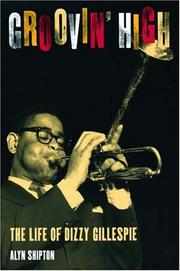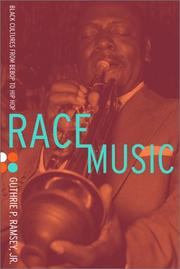| Listing 1 - 5 of 5 |
Sort by
|

ISBN: 128083532X 9786610835324 019802519X 0195349385 9780198025191 0195144104 9780195144109 9780190286828 0190286822 Year: 2001 Publisher: New York Oxford University Press
Abstract | Keywords | Export | Availability | Bookmark
 Loading...
Loading...Choose an application
- Reference Manager
- EndNote
- RefWorks (Direct export to RefWorks)
Dizzy Gillespie was one of the most important and best-loved musicians in jazz history. With his horn-rimmed glasses, goatee, jive talk, and upraised trumpet bell, he was the hipster who most personified bebop. The musical heir to Louis Armstrong, he created the modern jazz trumpet-playing style and dazzled aficionados and popular audiences alike for over 50 years. In this first full biography, Alyn Shipton covers all aspects of Dizzy's remarkable life and career, taking us through his days as a flashy trumpet player in the swing bands of the 1930's, his innovative bebop work in the 1940's,
Jazz musicians --- Gillespie, Dizzy, --- Berks, John, --- Birks, John, --- Gillespie, John Birks, --- Gillespie, John,
Book
ISBN: 0252050177 9780252050176 9780252083167 Year: 2017 Publisher: Urbana
Abstract | Keywords | Export | Availability | Bookmark
 Loading...
Loading...Choose an application
- Reference Manager
- EndNote
- RefWorks (Direct export to RefWorks)
Jazz musicians --- Gillespie, Dizzy, --- Ellington, Duke, --- Charles, Ray, --- Lincoln, Abbey --- Roach, Max, --- Silver, Horace, --- Evans, Bill, --- Evans, William John, --- Roach, Maxwell, --- Silva, Horace Ward Martin Tavares, --- Moseka, Aminata --- Wooldridge, Anna Marie --- Lee, Gaby --- Lincoln, Abby --- Robinson, Ray Charles, --- Berks, John, --- Birks, John, --- Gillespie, John Birks, --- Gillespie, John, --- Duke, Obie, --- Ėllington, Di︠u︡k, --- Ellington, Edward Kennedy, --- Ellington, Obie Duke, --- Greer, Sonny, --- Turner, Joe,
Book
ISBN: 0520971620 9780520971622 9780520280649 0520280644 Year: 2018 Publisher: Oakland, California
Abstract | Keywords | Export | Availability | Bookmark
 Loading...
Loading...Choose an application
- Reference Manager
- EndNote
- RefWorks (Direct export to RefWorks)
Sophisticated Giant presents the life and legacy of tenor saxophonist Dexter Gordon (1923-1990), one of the major innovators of modern jazz. In a context of biography, history, and memoir, Maxine Gordon has completed the book that her late husband began, weaving his "solo" turns with her voice and a chorus of voices from past and present. Reading like a jazz composition, the blend of research, anecdote, and a selection of Dexter's personal letters reflects his colorful life and legendary times. It is clear why the celebrated trumpet genius Dizzy Gillespie said to Dexter, "Man, you ought to leave your karma to science." Dexter Gordon the icon is the Dexter beloved and celebrated on albums, on film, and in jazz lore--even in a street named for him in Copenhagen. But this image of the cool jazzman fails to come to terms with the multidimensional man full of humor and wisdom, a figure who struggled to reconcile being both a creative outsider who broke the rules and a comforting insider who was a son, father, husband, and world citizen. This essential book is an attempt to fill in the gaps created by our misperceptions as well as the gaps left by Dexter himself.
Saxophonists --- Jazz musicians --- Gordon, Dexter, --- anecdote. --- celebrated trumpet genius. --- colorful life. --- cool jazzman. --- copenhagen. --- creative outsider. --- dexter gordon. --- dizzy gillespie. --- father. --- humor and wisdom. --- husband. --- iconic. --- innovator of modern jazz. --- jazz composition. --- jazz lore. --- jazz music. --- legacy. --- legendary times. --- multidimensional man. --- personal letters. --- research. --- son. --- tenor saxophone. --- world citizen.
Book
ISBN: 1282556134 9786612556135 0520945883 9780520945883 9780520261136 9781282556133 6612556137 Year: 2010 Publisher: Berkeley [etc.] University of California Press
Abstract | Keywords | Export | Availability | Bookmark
 Loading...
Loading...Choose an application
- Reference Manager
- EndNote
- RefWorks (Direct export to RefWorks)
Nat Hentoff, renowned jazz critic, civil liberties activist, and fearless contrarian-"I'm a Jewish atheist civil-libertarian pro-lifer"-has lived through much of jazz's history and has known many of jazz's most important figures, often as friend and confidant. Hentoff has been a tireless advocate for the neglected parts of jazz history, including forgotten sidemen and -women. This volume includes his best recent work-short essays, long interviews, and personal recollections. From Duke Ellington and Louis Armstrong to Ornette Coleman and Quincy Jones, Hentoff brings the jazz greats to life and traces their art to gospel, blues, and many other forms of American music. At the Jazz Band Ball also includes Hentoff's keen, cosmopolitan observations on a wide range of issues. The book shows how jazz and education are a vital partnership, how free expression is the essence of liberty, and how social justice issues like health care and strong civil rights and liberties keep all the arts-and all members of society-strong.
Music --- Jazz --- Criticism --- History and criticism. --- History and criticism --- Gillespie, Dizzy --- Armstrong, Louis --- Monk, Thelonious Sphere --- Woods, Phil --- Parker, Charles Christopher --- american music. --- american society. --- art. --- biographical. --- blues music. --- civil liberties. --- civil rights. --- contrarian. --- duke ellington. --- engaging. --- famous jazz musicians. --- feel good. --- free expression. --- gospel. --- health care. --- interviews. --- jazz band ball. --- jazz critics. --- jazz history. --- jazz lovers. --- jazz music. --- jazz musicians. --- jazz scene. --- louis armstrong. --- musicians. --- nonfiction. --- ornette coleman. --- personal history. --- political activists. --- quincy jones. --- retrospective. --- short essays. --- social justice issues.

ISBN: 0520210484 9780520243331 0520243331 1282358014 9786612358012 0520938437 1597348465 9780520938434 9780520210486 9781597348461 9780520210486 9780520243330 9782002068455 2002068453 9781282358010 6612358017 Year: 2003 Volume: 7 Publisher: Berkeley [etc.] Chicago University of California Press Center for Black Music Research
Abstract | Keywords | Export | Availability | Bookmark
 Loading...
Loading...Choose an application
- Reference Manager
- EndNote
- RefWorks (Direct export to RefWorks)
This powerful book covers the vast and various terrain of African American music, from bebop to hip-hop. Guthrie P. Ramsey, Jr., begins with an absorbing account of his own musical experiences with family and friends on the South Side of Chicago, evoking Sunday-morning worship services, family gatherings with food and dancing, and jam sessions at local nightclubs. This lays the foundation for a brilliant discussion of how musical meaning emerges in the private and communal realms of lived experience and how African American music has shaped and reflected identities in the black community. Deeply informed by Ramsey's experience as an accomplished musician, a sophisticated cultural theorist, and an enthusiast brought up in the community he discusses, Race Music explores the global influence and popularity of African American music, its social relevance, and key questions regarding its interpretation and criticism. Beginning with jazz, rhythm and blues, and gospel, this book demonstrates that while each genre of music is distinct-possessing its own conventions, performance practices, and formal qualities-each is also grounded in similar techniques and conceptual frameworks identified with African American musical traditions. Ramsey provides vivid glimpses of the careers of Dinah Washington, Louis Jordan, Dizzy Gillespie, Cootie Williams, and Mahalia Jackson, among others, to show how the social changes of the 1940's elicited an Afro-modernism that inspired much of the music and culture that followed. Race Music illustrates how, by transcending the boundaries between genres, black communities bridged generational divides and passed down knowledge of musical forms and styles. It also considers how the discourse of soul music contributed to the vibrant social climate of the Black Power Era. Multilayered and masterfully written, Race Music provides a dynamic framework for rethinking the many facets of African American music and the ethnocentric energy that infused its creation.
African Americans in popular culture --- Afro-Americains dans la culture populaire --- Afro-Amerikanen in de volkscultuur --- African Americans - Music - History and criticism. --- African Americans in popular culture. --- Popular music - Social aspects - United States. --- Music History & Criticism, National - Folk, Patriotic, Political --- Music --- Music, Dance, Drama & Film --- African Americans --- Popular music --- History and criticism. --- Social aspects --- Afro-Americans in popular culture --- Popular culture --- Music, Popular --- Music, Popular (Songs, etc.) --- Pop music --- Popular songs --- Popular vocal music --- Songs, Popular --- Vocal music, Popular --- Cover versions --- History and criticism --- United States --- african american music. --- african americans. --- afro modernism. --- american history. --- bebop. --- black americans. --- black communities. --- black culture. --- black music. --- black power era. --- chicago. --- cootie williams. --- cultural theorists. --- dinah washington. --- dizzy gillespie. --- ethnocentric. --- gospel music. --- hip hop. --- jam sessions. --- jazz. --- louis jordan. --- mahalia jackson. --- music and culture. --- musical meaning. --- musical styles. --- musicology. --- nonfiction. --- racial issues. --- rhythm and blues. --- social changes.
| Listing 1 - 5 of 5 |
Sort by
|

 Search
Search Feedback
Feedback About UniCat
About UniCat  Help
Help News
News